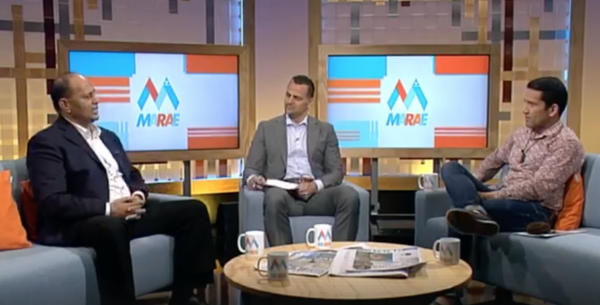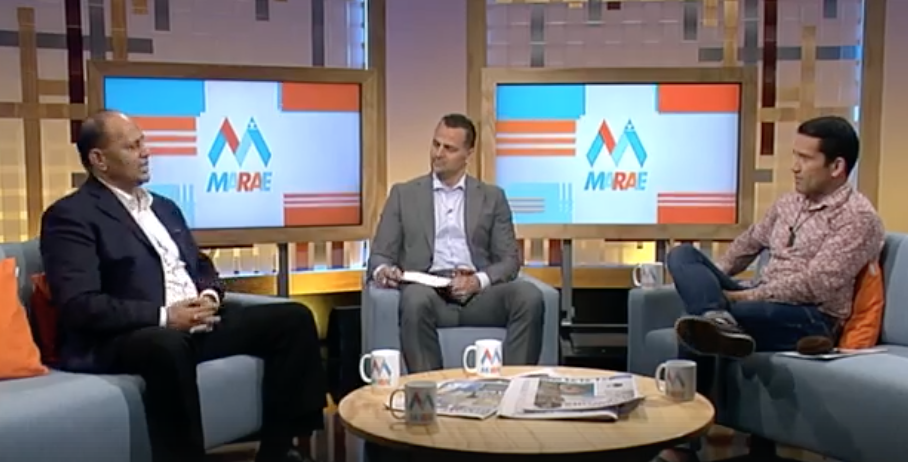
On the Marae show last Sunday alongside Dr Lance O’Sullivan, I debated the health system and it’s inequity for Māori.
It ended up being quite a robust debate which was probably necessary as Lance in my view, has said a few things that are just plain wrong.
Lance doesn’t accept that we as a Government inherited a total mess and shambles in terms of the health system; rotting hospital buildings with sewerage seeping through the walls; and an infrastructure that has had zero investment in it in the last 9 years.
He dismisses the fact that we have invested $850 million in infrastructure, and thinks our investment into under 14 year olds in terms of medical visits and community card holders is just a waste of time.
From what I can see, his solution is just to give all the money to him. And while I don’t necessarily think that an investment in Lance O’Sullivan is a bad idea, in fact it’s something that we as a government should probably think seriously about, his view that Governments should get out of the business is absolutely wrong.
We have an obligation to provide for the people of this country in the health area. Past Governments have not done well in this area, particularly in the Māori space so I know where Lance’s frustration comes from.
I have admired his work through the years as a doctor however, he has chosen to become political in the last few years so it was only appropriate that I responded, here’s the video:
Willie Jackson is the Minister for Employment






I heard Dr Sullivan suggesting we needed a real doctor to be made Minister if Health. He forgets we already had one: Dr Jonathan Coleman, who was as effective as trying to put out a bush fire with a garden hose. Coleman had all the empathy and warmness of a robot.
But I still have heaps of respect for the good Doctor and maybe the coalition govt should work with him rather than butting heads.
New Zealand’s hospitals have an average occupancy rate of 100%. They must also service 700,000 Māori out of a total population of about 4 million. Faced with such a crises, is it appropriate to be indifferent to patients waiting in long queues or should medical professionals show kindness to people they are familiar with. Tough one that.
New Zealand has plenty of arable land, plenty of water and natural greenery. Yet hospital food refuse to provide patients with fresh fruits and vegetables because among other things we choose to prioritise funding over patient care.
New Zealand lacks the economic benefits of a clutch of well designed hospitals fully integrated into the economy with access to on going innovations in medical investigations, treatment and care, transport services are not optimal. It will also cost the government an extra $850 million dollars just to keep the sterile smelling hospitals we already have.
With out philanthropy in medical research there will be more pressure placed on the health system as New Zealand faces an increasing elderly population. The government can train more well payed doctors and nurses but such efforts to improve health care will not be enough. Health care professionals need to continually innovate while health care policy can not remain static.
There’s a need to study health systems and adapt best practices to suit Māori health context.
Here’s a question for the “good” doctor…
why are holistic cures withheld and why have nearly 100 holistic doctors prematurely lost their lives?
Haven’t looked at any recent numbers. I estimate that 50% of Māori youth are unemployed. Before an holistic approach to Māori health can be reasoned. Māori must gain access to productive land before initiating any type of health program targeting Māori.
I agree with you 100 percent thanks Willy, Lance is hard to trust in that he seems out for himself and not that smart about it. Some people suggested he used the poor up north as a stepping stone. Did he? Hmm maybe. But he hasn’t been that successful politically and he seems to want that power. It means a lot in real terms for the poor the money put into Community Card and also free medical care for the young. What has he against this?
This debate seemed like a wasted opportunity. A useful forum was there for you both to address some of the real issues facing Maori Iwi/Hapu and families engaging in the established health system and how we can progress. Highlighting how much putea Labour has invested in the NZ health system, what poor systems Labour has inherited, and what the Doc’s political ties are, seemed to help and inform nobody.
You mentioned that Maori Leaders like Paparangi, Pomare, Tariana and Tamahere have said similar things. So why haven’t Maori Leaders both inside and outside Government been able to develop a system or tailor the current health system to be more responsive to Maori and deliver better outcomes?
He talked about the issues with Maori engaging in conventional western models of health and building new Maori health models. You kept bringing it back to him as an individual in the media spotlight and his historical political ties. Let’s not let the Doc’s political affiliations be an obstacle to progress for Maori. You both are in positions to make a real difference to Maori, so make the most of it. Don’t waste the opportunity.
Be a Leader, not just a Politician… There is a difference.
Maori leadership across maoridom have every right to be pushy and aggressive. Maori have inherited a health system based on our colonial forefathers. At every turn we have had Māori leaders like the Kingitanga movement, Dame Whena Copper and Titewhai Harawira, the list is long and distinguished. These people do not lay down for pleasant talking crown interests. In there early days their focus was on getting the basics right, access to resources, clean drinking water, proper sanitation, vaccination programmes to keep infectious diseases under control and strengthening our subsidised primary and acute services.
This emphases on the fundamentals natures a sturdy nationhood and will contribute to tino rangatiratanga and growth. Over 2018 the coalition government has introduced many sound policies to insure that quality care can be accessible to many New Zealanders, or to keep costs under control. Price will adjust to reflect the true cost of Māori health care provisions.
Generous Whanua Ora funding will insure that health care will remain affordable to all Māori, this is done through tiered subsidies to different reward classes. Iwi entities have also set up their own health care providers and education scholarships.
An important policy of co-payment is to discourage over consumption and over treatment. This means that for Māori to remain competitive it keeps health care costs down and drive by doctoring down so that patients are not being herded into treatments that are unnecessary or expedient and workers will benefit as companies can pay them higher wages.
Today New Zealand provides maoridom with some of the best healthcare in the pacific. But our population is ageing and more Māori are coming down with chronic diseases shared in common with 3rd world countries. These and other challenges will put pressure on the health care system. The government will continue to invest in improving the health of Māori. They’re building a hospital in Dunedin to meet the health care needs of that part of New Zealand. They’re also refitting North Shore Hospital to meet elected surgery needs, there operations will be integrated into the whole region so that patients can be transferred to hospitals depending on the level of care needed.
This will lead to better cost savings and a better allocation of our healthcare resources.
Comments are closed.